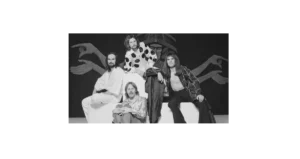Frank Bornemann: The Visionary Behind Eloy and German Progressive Rock
Frank Bornemann is celebrated as one of the key figures in the German progressive rock scene. As the founder, guitarist, vocalist, and main songwriter for the band Eloy, he left a powerful mark on European rock music. Bornemann’s distinctive voice, innovative guitar technique, and artistic vision helped shape progressive rock, both in Germany and beyond.
Early Life and Musical Influences
Born in Hanover in 1945, Frank Bornemann grew up in a rapidly changing Germany, where rock and blues captivated the younger generation. Inspired by British bands like The Beatles and The Rolling Stones, he developed a passion for music in his teenage years and began playing guitar. His interest in deeper, more experimental sounds soon led him toward progressive music, setting the stage for his influence on the genre.
The Formation of Eloy and Early Years
In 1969, Bornemann founded Eloy, taking the name from the “Eloi” characters in H.G. Wells’ novel The Time Machine. Initially, Eloy’s sound was a mix of blues and psychedelic rock, but the band soon transitioned toward more complex, avant-garde rock. Their self-titled debut album in 1971 introduced them to the music world and marked the beginning of an impactful journey.
Rising in the Progressive Rock Scene
By the mid-1970s, Eloy had moved away from their psychedelic roots and fully embraced progressive rock. With Inside (1973), Eloy began to gain a wider audience, thanks to Bornemann’s evocative vocals, philosophical lyrics, and hypnotic guitar work. Subsequent albums, like Floating (1974) and Power and the Passion (1975), cemented Eloy’s reputation, reaching listeners well beyond Germany.
Ocean: The Definitive Album
Released in 1977, Ocean is considered Eloy and Bornemann’s magnum opus. Based on the legend of Atlantis, Ocean is often hailed as a progressive rock masterpiece. Tracks like “Poseidon’s Creation” and “Incarnation of Logos” blend intense instrumentals with thought-provoking lyrics, crafting a unique and immersive experience. Ocean remains a defining album in the progressive genre, revered by fans and critics alike.
The 1980s: Evolution and Experimentation
During the 1980s, Eloy’s sound shifted to a more melodic style. Albums like Colours (1980) and Planets (1981) saw Bornemann exploring sci-fi themes and melodic hooks, while maintaining the band’s progressive foundation. Time to Turn (1982) marked another peak, blending Bornemann’s mature songwriting with Eloy’s trademark sound, reaching both loyal fans and new listeners.
Revival in the 1990s and Beyond
After a hiatus in the early 1990s, Bornemann revitalized Eloy with albums such as The Tides Return Forever (1994) and Ocean 2: The Answer (1998). These albums, while modern in production, remained true to Eloy’s progressive rock roots, demonstrating Bornemann’s ability to innovate without sacrificing the band’s core identity. To this day, he continues to play a leading role in the band as both musician and producer.
Bornemann’s Philosophical Approach
Frank Bornemann’s music is noted for its philosophical depth. Eloy’s lyrics often explore themes of the universe, the quest for meaning, and ancient myths. His music invites listeners into a reflective, almost spiritual experience. Bornemann’s goal is not only to entertain but also to inspire contemplation, making Eloy’s music a journey into introspection and discovery.
A Lasting Legacy
With a career spanning over 50 years, Frank Bornemann’s influence on progressive rock is undeniable. Eloy’s music, known for its depth and ambition, has inspired countless fans and musicians worldwide, solidifying Bornemann’s place as an icon in the genre. Eloy remains one of the most respected bands in progressive rock, with Frank Bornemann’s artistic legacy continuing to inspire new generations.




